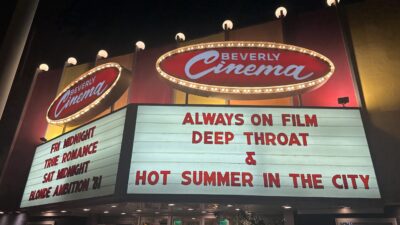Genre: Plunderphonics, Latin Electronic
Favorite Tracks: “LARA BRANGER (o ‘como duermes’),” “nada va a pasar,” “el chiste más largo de la historia”
Truth be told, it’s been ages since I’ve come across a project that depicts the Venezuelan experience as clearly and strongly as AMOR DE ENCAVA does. To be Venezuelan is to be constantly disillusioned: a country with a violent history, marked by persistent political and social unrest, high rates of disease, unemployment, and poverty, currently known for branding the American Continent’s greatest exodus and refugee crisis, mostly by young people searching for opportunities abroad. As weed420 said in an interview for Pagina12, “Venezuelans suffer when they stay and they suffer when they leave. The resignation one feels is surreal, it’s horrible.”
Those who’ve remained (mostly older generations who couldn’t imagine leaving their entire heritage behind) contend with the what-could-have-beens. Nostalgia as a haunting, all-consuming force has been the starting point for many internet-born music scenes: At its best, vaporwave reminds the listener of fragments of the past that could have resulted in potential futures, now forever unfulfilled. But where most hauntology music might paint with broad strokes and only appeal to a hazy, undefined sense of wistfulness, weed420 have been refreshingly hyper-specific: Their newest release is no exception. It’s a concept album about a Venezuelan bus driver, painfully wistful, on an endless trip to nowhere.
Some context: “Encava” refers to a company responsible for producing a significant number of the country’s bus units. There’s a very specific culture associated with these buses: Their interiors are heavily customized by their drivers, adorned with photographs, stickers, and plushies (such as the one on this album’s cover). Most of the vehicles are baptized, as if they were ships, with names of loved ones emblazoned on the rear window. There’s no such thing as a quiet ride. Most travels are soundtracked by blown-out, eclectic mixes curated by the driver: Merengue, salsa, vallenato, and reggaeton classics are often featured, usually slowed down or heavily edited. AMOR DE ENCAVA plays as one of these mixes, overtly digital and interspersed with spoken word and snippets of Venezuelan cultural artifacts like commercials and dialogue from iconic TV shows: In something as relatively mundane as public transport, the country and its many ghosts can’t help but bleed in.
Shortly after its release, the album’s scope was widened by a short YouTube video where the members of weed420 informally interviewed different “encaveros” or Encava drivers. The men interviewed are all boisterous and eccentric in their own ways, every answer preceded with a joke or a playful barb. They agree on the job’s arduous nature, mentioning how the overwhelming heat and frequently disruptive passengers piss them off on the regular. When asked about the music played in these bus units, a driver named Oscar solemnly explains that even if it annoys many of the passengers, most drivers need some amount of noise and music to work through their shifts, as a way to relieve stress and block out anything troubling them.
I can only imagine how this might have resonated with weed420: Even at their most riotous and irreverent, they know better than anyone else how comforting noise can be. AMOR DE ENCAVA, their finest offering to date, expertly employs static, feedback, and digital clatter to depict how even the most abrasive sounds can transport you somewhere else, for better or for worse.
The recording that opens the album, titled after the coordinates for Valencia City’s main transit center, depicts a common scene: A man yells out greetings to apathetic passengers, setting the scene for him and his friends to busk and perform a freestyle rap in hopes of receiving donations. The man interacts with the first person he locks eyes with, asking for their name (in this case, a disgruntled woman named Carolina). As soon as he goes, “Carolina, listen to this,” a deluge of disparate sounds (reversed cymbals, searing guitar feedback, and DJ tags) rushes into the mix. The album henceforth operates in the most uncanny, hypnagogic of terms, noise biting at every arrangement so thoroughly it makes the few-and-far-between moments of levity feel more than a little bit sinister. As a DJ tag on “nada va a pasar” says, this is the sound of a country dying.
weed420 are no strangers to genre hopping. Their debut mixtape MALANDREO CONCEPTUAL is a playful mix of reggaeton and experimental Latin electronica, holding surprisingly tight grooves writhing under dense sound collages. This fascination with rhythm remains; even if some of the dembow has been swapped with salsa percussion, the push-and-pull between the cadences of the samples and the rhythm section give AMOR DE ENCAVA its beating heart, especially in its more manic first half. Standout track “LARA BRANGER (o ‘como duermes’)” cycles through drill ‘n’ bass, dancehall, and hip hop breaks at unreal speed, holding groove sacred above all else. “MALUCA” is more steady, with traffic horns and blaring synths being restrained by a constant snare-and-shaker groove, yet it signals a shift towards the melancholic. It also features a repurposed bridge of the reggaeton classic “Llamado de Emergencia,” a staple of any Latin American party, transformed into something desperate and intense.
As riotous and abrasive as it is, there’s barely anything jubilant about AMOR DE ENCAVA. Besides a couple of jokes cracked here and there by DJ announcers and text-to-speech engines, the mood is dour, dark, and oppressive. Water-damaged synths and distant, distorted vocals circle every mix like vultures. The salsa baúl that serves as the main inspiration for the album’s sound lends its melodrama: The vocals that remain unobscured by the noise all are centered around heartbreak, loss, and loneliness verging on isolation. Most of these samples come from songs centered around romantic relationships, but are these not the same feelings experienced by someone leaving their country behind, uprooting their way of life and starting over? Someone who refused to depart even as their friends and family searched for greener pastures?
The emotional brunt of the album rests on its longest and most complex track, “el chiste más largo de la historia.” The first three minutes are deceivingly tranquil, sweet electric piano submerging the track in dreamy, syrupy bliss. A warbly salsa vocal comes in alongside clinking glasses and rushes of static. It sounds like a party winding down until around the three-minute mark, a burst of shoegaze-y guitars starting a delirious build-up that almost feels like an exorcism, exhausting but ultimately freeing. The fiery wall of sound mutates and morphs right up until the last minute, where it’s carried out by static and shaky harmonics. It’s a perfect track to signal the beginning of the end: The last two tracks seem to revel in its aftershocks (especially “terminal,” which follows a similar progression but is slightly less melancholic, with an outro punctuated by the jeers and chants of an energized crowd). The album’s closer is composed almost entirely of clarion bus horns, droning harmonics ending the album on a distinctly fretful note.
AMOR DE ENCAVA is a dense and tangled album that triumphs in two main ways: It works excellently as protest music, communicating through sheer sound alone the current trials and tribulations of Venezuelan living, but it also serves as a candid tribute to the sounds, visuals, and culture that inspired its inception in the first place. Chaos has always been the name of the game for weed420, their collages bursting at the seams and jumping right out of your speakers, but here they’ve harnessed something sharp, visceral, and devastating out of traffic noise, TV commercials, and technicolor synths. Anyone unfamiliar with its many, many references still won’t be able to shake off the distinct sense of longing and loss it invokes; a mirage of things lost, a melody long forgotten, beckoning from afar.
















Comments